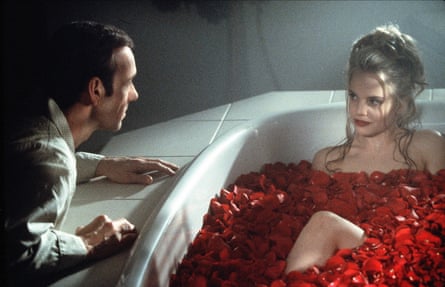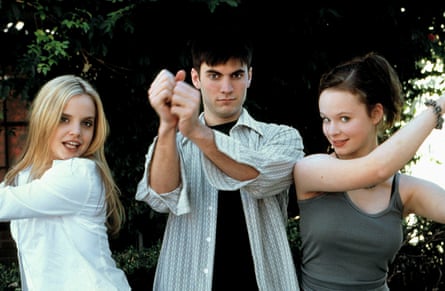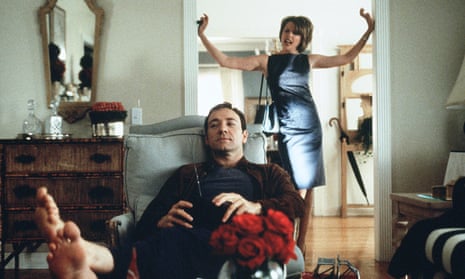I was 16 when I first saw American Beauty; it was the ideal age for it, though I didn’t know it then. In my last year of high school, with the adult world beckoning but largely unexplored, Sam Mendes and Alan Ball’s tart, neat diorama of suburban discord seemed excitingly grown-up, a lucid, witty articulation of all my most cynical teenage suppositions about my elders: that they were tortured and miserable and a bit pathetic, though with enough money and sex drive to make their ennui soapily intriguing.
I certainly didn’t want to grow up into Lester Burnham, the film’s skeevily loosened white-collar hero: though the film was sympathetic to his midlife crisis, complete with a sports car, an indifferently lost job and an infatuation with his teenage daughter’s schoolmate, it wasn’t so tin-eared as to deem him cool. Nor could I admire any of the variously uptight adults in his orbit, from his prissy, materialistic realtor wife to his tersely closeted nextdoor neighbor.
Still, I suppose I hoped to be a bit like American Beauty itself: quick and quippy and a bit poetic, nasty-smart and slickly good-looking. To that end, I watched the film several times that year, repeatedly read and practically memorised the screenplay that came as a free tie-in to an issue of Sight & Sound, and used it as a primary reference in a precocious English essay about white male irrelevance that, come to think of it, may have been more 2019 than 1999. “Look closer,” the poster instructed. I’m not sure I did, though I certainly thought about a lot. It was, for better or worse, a formative film.
I wasn’t alone, of course. Many people far older than me formed a similar attachment to the film’s glib, elegant, philosophically underscored comedy, not least the collective members of the Academy, who handed it five Oscars, including best picture, director and actor – the second for Kevin Spacey, and the one prize for the film that voters would probably soonest take back, given what we now know of his own lecherous middle-aged proclivities. It was a year, moreover, when the Academy was led by critics to their eventual choice. The film sailed on a current of breathless rave reviews from its debut at the Toronto film festival – a more unusual place to launch a major awards contender, back when major studio productions still dominated the race, though its success there set a new model for prestige autumn films with golden ambitions.
It’s easy to forget that American Beauty was seen as such an unusually fresh, fashionable Oscar victor by the end of the 90s. In a decade dominated by burnished period spectacle, it was the first contemporary-set best picture winner since The Silence of the Lambs eight years before; its win was seen as a triumph for riskier, more sensuous American cinema. A year after Harvey Weinstein famously strategised a seven-Oscar sweep for the dainty comforts of Shakespeare in Love over DreamWorks’ robust frontrunner Saving Private Ryan, American Beauty marked the latter studio’s revenge: its relative edginess handily trounced its main opponent (and Weinstein’s favored contender), Lasse Hallström’s wet, weedy literary adaptation The Cider House Rules. It seemed, for a time, that the Academy had anointed a new American classic.

Yet the pushback against American Beauty in the intervening two decades has been swift and merciless – taking root well before Spacey’s personal and professional downfall, though that certainly hasn’t helped. Ask film critics of various ages about it now and you will tend to meet with a uniform sneer, along with a blanket dismissal of its cheap-shot picket-fence satire, its broad characterisation, its purportedly misogynistic view of career women, or its awestruck command of metaphor as flimsy and floaty as, well, a plastic bag dancing in the breeze.
You might hear grudging acknowledgement of its formal artistry, including the satin tactility of the late Conrad L Hall’s cinematography, or the eerie, echo-y, endlessly imitated percussion of Thomas Newman’s once-ubiquitous score. But that, too, is tempered with dismissiveness toward its makers. Theatre maestro Mendes never had quite the directorial career expected of him after American Beauty, as every one of his subsequent dramatic films (from Road to Perdition to the indie misfire Away We Go) registered as something of a handsome, impersonal disappointment, until he found his groove as part of the James Bond machine in Skyfall. Ball, meanwhile, somewhat undermined his breakout script by returning to its dysfunctional family themes to far richer, more exploratory, more tonally complex effect in Six Feet Under for cable TV – the place, some have argued, where American Beauty’s warped sitcom premise belonged to begin with.
Not helping its case was that 1999 came to be canonised by critics as a modern landmark year in American cinema, yielding a bounty of innovative, influential milestone works both in the multiplex and indie spheres: from The Matrix to Magnolia, The Sixth Sense to Being John Malkovich, Eyes Wide Shut to Election, Fight Club to The Talented Mr Ripley. (The latter, of course, was the jewel in Weinstein’s crown that year; of course he set it aside for The Cider House Rules when it came to awards campaigning.) Critical consensus now has Michael Mann’s controlled, sinewy, morally shaded media study The Insider (seven nominations, zero wins) as the film most wronged by American Beauty’s Oscar haul.
2019 has seen a barrage of cinephile retrospectives of that extraordinary vintage, most them going out of their way to mention Mendes and Ball’s film as cursorily as possible, if at all. The critics of The Ringer listed at number 26 in their 50 Best Films of 1999 countdown, a placement that seems more generous than their sniffy assessment: “Even at the time it felt a subpar representative for such an inventive year … [but it] has made an indelible mark on pop culture.” With praise that faint, you can count on even that supposedly indelible mark washing out at some point.

And yet, with all this revisionist perspective in my head, I popped in American Beauty recently to find it oddly, sinuously bewitching still. Dated, yes, but that’s a double-edged sword: it turns out to be an exquisitely presented time capsule, a snapshot of middle-class, notionally liberal white society entering a spasm of panic at the turn of both the century and the Clinton era. Its satire isn’t sophisticated, but it’s pointed, identifiable, and still often cuttingly funny, emblematic of a tone of withering pre-millennial snark that has since been earnestly outmoded, and not for the wittier.
It was never intended as straightforward drama, but as garish suburban burlesque: a distorted funhouse mirror reflection of America already at its ugliest, with its performances and petal-strewn visuals expertly heightened to match. By that token, it works a charm: view Spacey’s brilliantly icky-droll performance not as an exercise in misplaced heroism, but as a grim, complicit prophet of an even more dishonest, self-serving era of American patriarchy to come. Spacey’s uncovered private life makes the joke a bit sicker, admittedly, but damn if he isn’t pitch perfect in this.
There are, of course, false notes aplenty, ones more critics ought to have spotted even then: Annette Bening’s unhinged virtuosity only goes so far towards concealing what an ungenerous, ill-thought con the character of Carolyn Burnham is, not so much an empty woman as an empty construct. The teenage characters are all emo and no real emotion, vessels for the film’s sweetest but thinnest stabs at profundity. (American Beauty is a film that feels most authentic when it’s least sincere.) And that script I loved so much, for all its smart, savoury dialogue, is built on diagrammatic ironies – the homophobic military man’s a closet case, the self-styled slutty girl’s a virgin – that all ring a bit screenwriting 101, whatever truths are embedded within.
And yet, and yet. I remain deeply, melancholically affected by American Beauty – partly, of course, because it reflects gently back to me the unformed, uncertain child I was when I first saw it. But it also moves me on its own terms and merits, its own sly critique of a fragile milieu, its own pristinely art-directed yin-yang of sadness and sarcasm, its own vulnerable but defensively lacquered performances. Hell, I still think all the rose petal business is woozily beautiful. Twenty years on, American Beauty isn’t as clever as we thought it was, though it’s inadvertently aged into a kind of wounded, embattled wisdom. Perhaps it’s worth looking closer.
